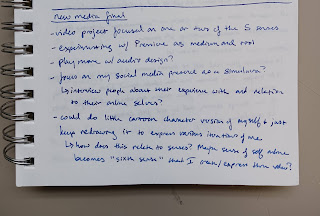Presentation: John Cage
 |
| John Cage, circa 1986. |
I did also find joy in reading about Cage's life and work and thinking about his connections to McLuhan. His artistic sensibilities are somewhat unfathomable to me, for the reasons mentioned above, but he seems like someone I would have connected with on a personal level. His history of travel and his wide field of inspiration are things I aspire to have as well. In general, it was great fun to learn more about this very important figure in the music world, which, might I add, none of my music theory courses ever taught me about. I hope my audience also enjoyed learning about him.
Photo credit: Hartmann, Erich. Photograph. American composer John CAGE. ARTstor, library.artstor.org/asset/AMAGNUMIG_10311520476. 1986. 7 November 2021.

You did such a great job on your presentation! It was so interesting to learn more about John Cage and how he relates to McLuhan. I agree, I haven't much thought about silence before, but hearing you speak about it got me really thinking.
ReplyDeleteYour presentation was great. I also think it's funny that he was so bad at harmony and a lot of things composer are "supposed" to be good at. Maybe this is what made him so amazing in the avant-garde sense.
ReplyDeleteNot only in music, I think learning to appreciate silence in everyday life is a subject we could explore
ReplyDeleteI am sorry I didn't get to see your presentation. I'm sure I would have enjoyed it.
ReplyDeleteAs a practitioner of psychotherapy, silence is a powerful tool on many levels. It draws out those thoughts and emotions often just below awareness, or those chosen to be hidden, or those needing to be seen and heard. On a more personal note, and as an acknowledged introvert, silence is a salve for the soul and a necessary part of one's well-being (in my humble opinion).